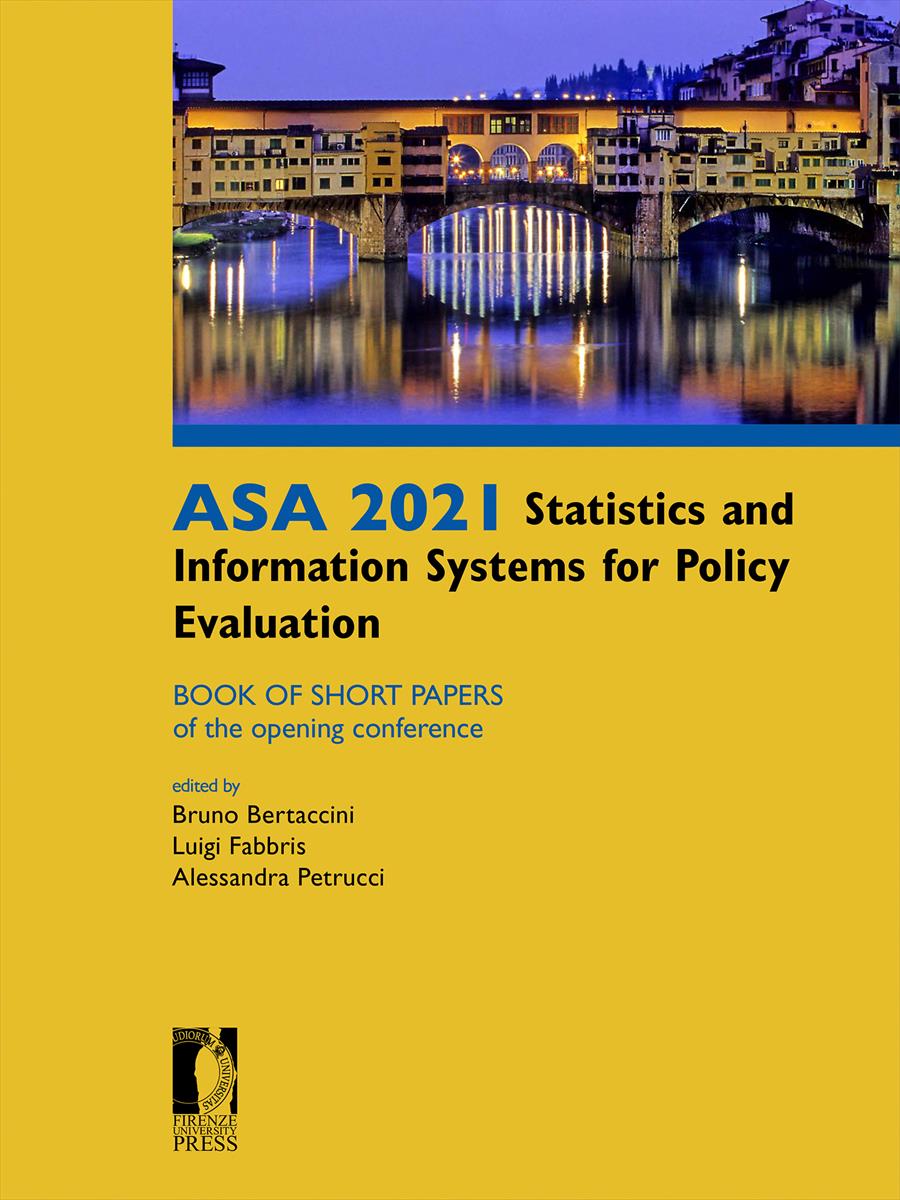- ASA 2021 Statistics and Information Systems for Policy Evaluation
- Edited by Bruno Bertaccini, Luigi Fabbris, Alessandra Petrucci
The Financial Wellbeing Index: “Donne al quadrato” and the relevant impact measurement
- Claudia Segre
- Serena Spagnolo
- Valentina Gabella
- Valentina Langella
- © 2021 Author(s) |
- CC BY 4.0
- DOI: 10.36253/978-88-5518-304-8.16
How can we reduce economic violence? Can financial literacy and education enhance economic wellbeing? The present paper reports the results of a research conducted by ALTIS – Università Cattolica and Global Thinking Foundation for the evaluation of changes, improvements and consequences produced by the educational course in financial literacy ‘Donne al quadrato’, provided by the Foundation among the policies against economic violence implementation. In this study, impacts’ measurement refers to conceptual framework of financial wellbeing, a composite notion constructed of objective and subjective dimensions related to people’s financial behaviour. The expression ‘Financial Wellbeing’ highlights how economic issues are inextricably bound to individual and social wellness. Helping people enhancing their own financial wellbeing – in a broad sense – should then be the very first purpose of economic education activity. In the present research, financial wellbeing has been measured by the implementation of a synthetic index, based on studies of World Bank and University of Bristol. The index is intended to measure people’s self-sufficiency and independence about their financial situation, resources and capabilities. The indicator takes into account both micro and macro features, being the first ones specific of the sample analysed and latter territorial context variables employed for the removal of the macroeconomic changes affecting the entire population from the specific changes proceeding from the training. The trial, involving different Italian regions, has been fulfilled by the administration of a tailoredmade survey pre and post the “Donne al Quadrato” course, during academic year 2019/2020, in order to register the change occurred in the respondents’ perception of their knowledge, behaviour, personality and aptitudes. The results of the experimentation demonstrated that financial education could engender the modification not only of knowledge but also of awareness and proficiency in financial behaviours, as well as the increase of course participants’ financial wellbeing.
- Keywords:
- financial wellbeing,
- financial literacy,
- economic violence,
Global Thinking Foundation, Italy
Global Thinking Foundation, Italy
Catholic University of Sacro Cuore of Milan, Italy
Catholic University of Sacro Cuore of Milan, Italy
- Atkinson, A., Messy, F. A. (2011). Assessing financial literacy in 12 countries: an OECD/INFE international pilot exercise. Journal of Pension Economics & Finance, 10(4), pp. 657-665.
- Atkinson, A. and F. Messy (2012), Measuring Financial Literacy: Results of the OECD / International Network on Financial Education (INFE) Pilot Study, OECD Working Papers on Finance, Insurance and Private Pensions, No. 15, OECD Publishing, Paris, (FR).
- Delafrooz, N., Paim, L. H. (2011). Determinants of financial wellness among Malaysia workers. African Journal of Business Management, 5(24), 10092-10100.
- Gerrans, P., Speelman, C., Campitelli, G. (2014). The relationship between personal financial wellness and financial wellbeing: A structural equation modelling approach. Journal of Family and Economic Issues, 35(2), pp. 145-160.
- Hayes, D., Evans, J., Finney, A. (2016). Momentum UK Household Financial Wellness Index: Wave one. Personal Finance Research Centre (PFRC), University of Bristol for Momentum UK.
- Holzmann, R., Mulaj, F., & Perotti, V. (2013). Financial capability in low-and middle-income countries: measurement and evaluation, World Bank, Washington, DC, (USA).
- Kempson, E., Perotti, V., Scott, K. (2013a). Measuring financial capability: a new instrument and results from low-and middle-income countries, World Bank, Washington, DC, (USA).
- Kempson, E., Perotti, V., Scott, K. (2013b). Measuring Financial Capability: Questionnaires and Implementation Guidance for Low-, and Middle-Income Countries, World Bank, Washington, DC, (USA).
- Kempson, E., Finney, A., & Poppe, C. (2017). Financial well-being, a conceptual model and preliminary analysis, SIFO Working Paper No. 3-2017, Oslo and Akershus University College of Applied Sciences, Oslo, (NO).
Chapter Information
Chapter Title
The Financial Wellbeing Index: “Donne al quadrato” and the relevant impact measurement
Authors
Claudia Segre, Serena Spagnolo, Valentina Gabella, Valentina Langella
Language
English
DOI
10.36253/978-88-5518-304-8.16
Peer Reviewed
Publication Year
2021
Copyright Information
© 2021 Author(s)
Content License
Metadata License
Bibliographic Information
Book Title
ASA 2021 Statistics and Information Systems for Policy Evaluation
Book Subtitle
Book of short papers of the opening conference
Editors
Bruno Bertaccini, Luigi Fabbris, Alessandra Petrucci
Peer Reviewed
Publication Year
2021
Copyright Information
© 2021 Author(s)
Content License
Metadata License
Publisher Name
Firenze University Press
DOI
10.36253/978-88-5518-304-8
eISBN (pdf)
978-88-5518-304-8
eISBN (xml)
978-88-5518-305-5
Series Title
Proceedings e report
Series ISSN
2704-601X
Series E-ISSN
2704-5846
